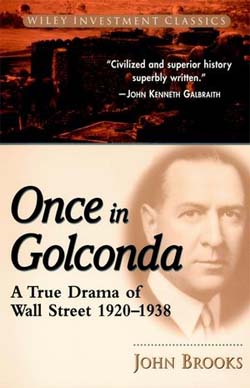Apr 15, 2025
Apr 15, 2025
Golconda, now a ruin, was a city in southeastern India where, according to legend, everyone who passed through got rich. A similar legend attached to Wall Street between the wars. ' John Brooks, 'Once in Golconda'
 I just finished reading this 1969 classic by John Brooks entitled, 'Once in Golconda: A true drama of Wall Street: 1920-1938", which beautifully epitomizes the true nature of the inner workings of Wall Street before and during the Depression era. When you read it in the context of what this country is going through in the present times, it is indeed appalling to note the stark similarities on Wall Street between the two eras several decades apart. As you read about the high and mighty with their stock pool schemes and rigging of stock prices in the 20s' and compare it to the speculation in derivatives and Ponzi schemes in the present era you are left with a sense of disbelief and disillusionment not just with regards to Wall street but to capitalism in general. The insatiable greed amongst the bankers and operators on Wall Street during the bygone era is very much alive in the modern day investment bankers with their mansions, yachts, big fat bonuses and complex derivatives!
I just finished reading this 1969 classic by John Brooks entitled, 'Once in Golconda: A true drama of Wall Street: 1920-1938", which beautifully epitomizes the true nature of the inner workings of Wall Street before and during the Depression era. When you read it in the context of what this country is going through in the present times, it is indeed appalling to note the stark similarities on Wall Street between the two eras several decades apart. As you read about the high and mighty with their stock pool schemes and rigging of stock prices in the 20s' and compare it to the speculation in derivatives and Ponzi schemes in the present era you are left with a sense of disbelief and disillusionment not just with regards to Wall street but to capitalism in general. The insatiable greed amongst the bankers and operators on Wall Street during the bygone era is very much alive in the modern day investment bankers with their mansions, yachts, big fat bonuses and complex derivatives!
John Bogle, who founded and headed Vanguard investments for a number of years has written another remarkable book , 'Enough' in which he repudiates the rich bankers who he says don't know when to say enough is enough. How else do you explain the fact that Merrill Lynch which recently went to the government begging for bailout money ended up paying hefty bonuses for their executives out of the TARP funds that came from taxpayers' money. And on top of that their now infamous CEO, John Thain was also reported to have spent up to $1.2 million to renovate his office which included expensive rugs, furniture and a trash can that cost $1400! Now what exactly do you do with such an expensive trash can. Well maybe he did need a special trash can after all which could handle all the complex derivatives and toxic mess such as SIV, CDOs, etc.
Is it just a few bad apples or quite a whole bunch that have hoodwinked the system and played the game quite skillfully? Take the case of the recently discredited Bernie Madoff who ran an extremely successful hedge fund investment firms and was an icon of Wall Street, a financial guru! He was considered one of the best and brightest in the trade and was something of a legend. It turns out that the gifted Mr. Madoff managed to fool all the people all the time, which is until now. He performed several clever tricks and ran an incredibly well oiled Ponzi scheme in which investments worth $50 billion magically vanished. He must have a gigantic ego and no conscience whatsoever while his victims who numbered in the thousands saw their lifetime investments disappear in an instant. I guess his philosophy must have been very similar to Marie Antoinette! Mr. Madoff represented Wall Street and headed NASDAQ once upon a time, in which case he is a microcosm of the Street. What that tells us about Wall Street as a whole is that wild speculation, gambling and slander may have all been a part of its life right from its humble beginnings! Alas, the bankers whom you trust your money with have all become banksters!
Now to digress a little bit, but not really, is the bizarre case of B. Ramalinga Raju who was busy cooking the books not very far from the ruins of Golconda. His meteoric rise to fame and subsequent fall has eerie parallels to the case of Mr. Madoff. Mr. Raju ran a successful firm, Satyam, which became a titan of the IT sector in India and was the first Indian internet firm to be enlisted on the NASDAQ. With a sleight of hand, he managed to make about a billion dollars disappear, all under the watchful eyes of global regulatory agencies. It appears that there is an over-abundance of greed amongst the ones that have reached the pinnacle of success.
A recent report in Reuters suggests that the arrogance and narcissism of CEOs resulting in extravagant perks maybe directly linked to their inherent DNA! While a number of questions are being raised as to what exactly caused the global financial meltdown that originated in the US, several fingers are also pointing towards the regulatory agencies themselves. Is deregulation part of the problem along with several other hidden market forces that created the sub-prime crisis, credit crisis and now the global financial meltdown? In which case, who will bell the cat?
08-Feb-2009
More by : Subra Narayan

|
This article was very interesting that the top people were able to convince many. It is confusing how it is able to happen so easily as described. Thanks for the good read! |